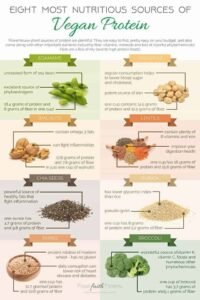How to get enough protein on a plant-based diet

Getting enough protein on a plant-based diet is entirely achievable with some knowledge and planning. While animal products are high in protein, there are numerous plant-based protein sources that can meet your daily requirements. Here are some tips on how to get enough protein on a plant-based diet:
- Legumes: Incorporate legumes such as lentils, chickpeas, black beans, kidney beans, and soybeans into your diet. These are excellent sources of protein and can be used in a variety of dishes, including soups, salads, stews, and curries.
- Tofu and Tempeh: Tofu and tempeh, both made from soybeans, are rich sources of plant-based protein. They are versatile and can be grilled, stir-fried, or added to sandwiches and salads.
- Quinoa: Quinoa is a complete protein, meaning it contains all nine essential amino acids. It makes a great base for bowls, salads, and side dishes.
- Nuts and Seeds: Almonds, peanuts, chia seeds, hemp seeds, and pumpkin seeds are protein-rich and can be sprinkled on top of yogurt, oatmeal, or salads.
- Whole Grains: Incorporate whole grains like brown rice, farro, barley, and whole wheat into your meals. They contain a decent amount of protein and are a healthy carbohydrate source.
- Seitan: Seitan is made from gluten and is a popular meat substitute with a high protein content. It can be used in various dishes, including stir-fries and sandwiches.
- Plant-Based Protein Powders: If you have trouble meeting your protein needs through food alone, consider adding plant-based protein powders to smoothies or shakes. Look for powders made from pea, hemp, or rice proteins.
- Leafy Greens: While they might not be as protein-dense as legumes, leafy greens like spinach, kale, and broccoli contain protein and should be included in your diet for overall nutrition.
- Plant-Based Meat Alternatives: Many meat substitutes like veggie burgers, sausages, and meatless ground are made from plant-based protein sources. These can be convenient options when transitioning to a plant-based diet.
- Combining Proteins: To ensure you get all essential amino acids, focus on combining different plant-based protein sources throughout the day. For example, pair beans with rice or lentils with quinoa.
- Snack Wisely: Choose protein-rich snacks such as roasted chickpeas, edamame, or a handful of nuts to keep your energy levels stable between meals.
- Plan Balanced Meals: Plan your meals to include a variety of protein-rich plant foods alongside fruits, vegetables, and healthy fats for a well-rounded and nutrient-dense diet.
Remember that individual protein needs vary based on factors such as age, gender, activity level, and overall health. If you have specific dietary concerns or are unsure about your protein intake, consider consulting a registered dietitian or nutritionist to create a personalized plant-based meal plan that meets your nutritional requirements. With proper planning and knowledge, a plant-based diet can provide all the protein your body needs for optimal health.

Comments